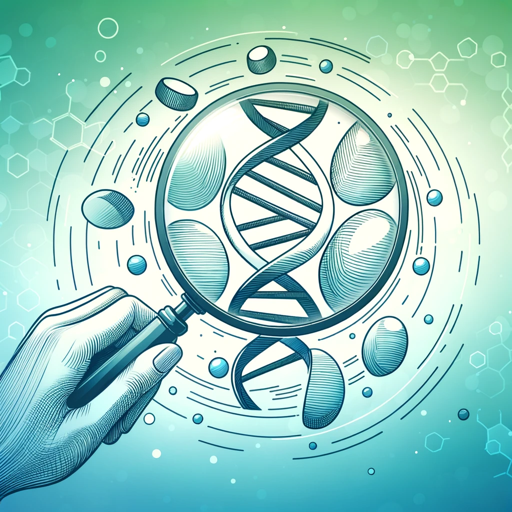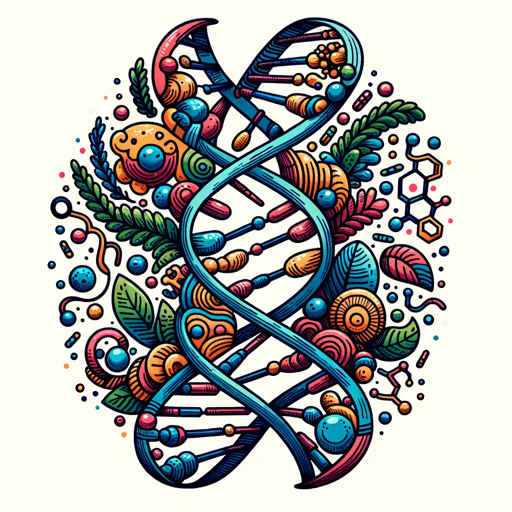Biochemistry-AI-powered biochemistry assistance
Your AI-powered biochemistry tutor.
Related Tools
Load More
Biology Bio
🔷#𝟏 𝐒𝐩𝐞𝐜𝐢𝐚𝐥𝐢𝐳𝐞𝐝 𝐄𝐱𝐩𝐞𝐫𝐭 𝐁𝐢𝐨𝐥𝐨𝐠𝐲 𝐓𝐮𝐭𝐨𝐫🔷

Biology Professor
Your biology expert

Biology Laboratory Expert (Protocol&Analysis)
Version: 2.0 (2024. 05. 28) Establishing and reviewing protocols for biological experiments. Designing animal models for research purposes. Conducting NGS and single-cell analysis using R and Python. * Add Code interpreter function

BioChem Research GPT
A Specialized Biochemistry and Pharmaceutical Research Assistant

Biology ExpertGPT All Levels
Expert in biology / Medicinal Biology aiding in study and research.

Cell Biology Guide
Your expert guide in cell biology.
20.0 / 5 (200 votes)
Introduction to Biochemistry
Biochemistry is the study of the chemical processes and substances that occur within living organisms. It combines principles from both biology and chemistry to explore the molecular mechanisms that underpin various biological functions. Biochemistry focuses on understanding how biomolecules such as proteins, lipids, carbohydrates, and nucleic acids contribute to cellular processes, structure, and function. For instance, studying how enzymes catalyze biochemical reactions provides insights into metabolic pathways and disease mechanisms. An example scenario is investigating the biochemical pathways involved in energy production within cells, such as glycolysis and the citric acid cycle.

Main Functions of Biochemistry
Metabolic Pathway Analysis
Example
Understanding glycolysis and the citric acid cycle
Scenario
Analyzing how glucose is broken down to produce ATP in cellular respiration.
Enzyme Activity and Mechanism
Example
Study of enzyme kinetics
Scenario
Investigating how enzymes like hexokinase facilitate the conversion of glucose to glucose-6-phosphate.
Molecular Genetics
Example
DNA replication and transcription
Scenario
Exploring how genetic information is copied and transcribed into RNA for protein synthesis.
Ideal Users of Biochemistry Services
Medical Researchers
Researchers focusing on understanding disease mechanisms and developing treatments. They benefit from biochemistry by gaining insights into molecular pathways involved in diseases such as cancer, diabetes, and genetic disorders.
Pharmaceutical Developers
Professionals involved in drug discovery and development. Biochemistry helps them understand target molecules and mechanisms of action, which is critical for developing effective pharmaceuticals.

How to Use Biochemistry
Visit aichatonline.org for a free trial without login, also no need for ChatGPT Plus.
Start by accessing the website for a free trial. No login or ChatGPT Plus subscription is required.
Prepare your study materials.
Gather your textbooks, notes, and any specific topics or questions you need help with in biochemistry.
Interact with the tool.
Use the AI-powered tool to ask specific questions, clarify concepts, and get detailed explanations about biochemistry topics.
Review the responses.
Carefully read and review the answers provided by the AI. Cross-check with your materials if needed.
Apply the knowledge.
Utilize the information gained to complete assignments, prepare for exams, or deepen your understanding of biochemistry.
Try other advanced and practical GPTs
🖼️ Artistic Visionary
Transform ideas into artistic reality with AI.

UX Mentor
AI-powered UX and Design Leadership

Drizzle ORM Code Writer and Reviewer
AI-powered Drizzle ORM coding assistance.

English Lesson Planner
AI-Powered English Lesson Plans

Style Mixer for Sustainable Fashion
AI-Powered Sustainable Style Solutions

Find a Laptop GPT
AI-powered Laptop Recommendations Tailored to You

Investigador Fiable
AI-powered research for credible information

Business Mentor
AI-powered business guidance

TOEIC Tutor
AI-powered TOEIC practice and feedback

Oracle SQL
AI-Powered Oracle SQL Assistant

Matthew Mercer GPT
Elevate your storytelling with AI-powered creativity.

UiUx Guru
AI-Driven UI/UX Design, Simplified

- Research
- Education
- Development
- Innovation
- Health
Common Questions about Biochemistry
What are the main functions of lipids in biological systems?
Lipids serve as energy storage, structural components of cell membranes, and signaling molecules. They provide insulation, protect organs, and are involved in cellular communication.
How do enzymes catalyze biochemical reactions?
Enzymes catalyze reactions by lowering the activation energy required. They achieve this through mechanisms such as induced fit, acid-base catalysis, and covalent bonding with substrates.
What is the role of vitamins in biochemistry?
Vitamins act as coenzymes or precursors for coenzymes in various biochemical reactions. They are essential for metabolism, immune function, and cellular processes.
How do nucleotides function in cells?
Nucleotides are the building blocks of nucleic acids (DNA and RNA). They store genetic information, participate in cellular signaling (cAMP), and are involved in energy transfer (ATP).
What is the importance of protein structure in their function?
Protein structure determines its function. The specific sequence and folding of amino acids enable proteins to interact with other molecules, catalyze reactions, and provide structural support.